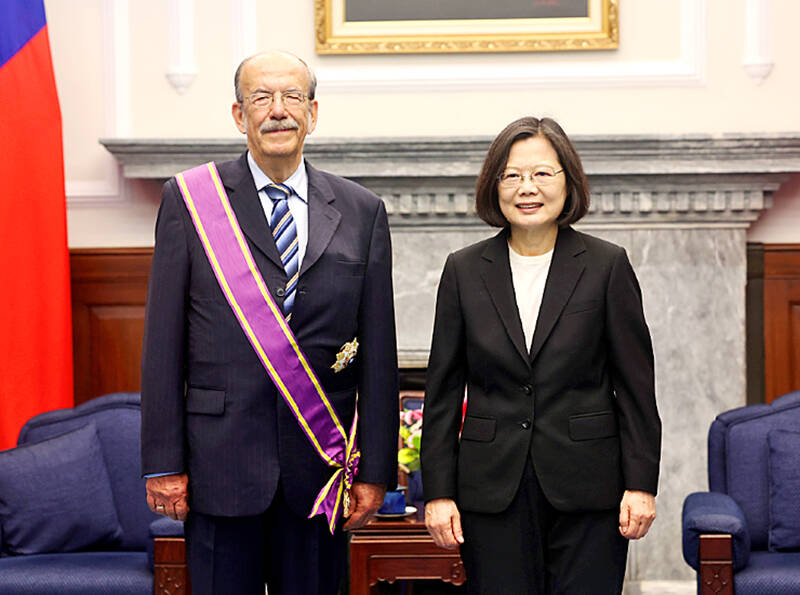Gerrit van der Wees, a former Dutch diplomat and founder of a pro-democracy publication in Taiwan, was awarded a presidential medal by President Tsai Ing-wen (蔡英文) yesterday for his contributions to the country.
Tsai conferred the Order of Brilliant Star with Grand Cordon on van der Wees, primarily for his work as chief editor of Taiwan Communiqué, a bi-monthly publication chronicling developments in and around Taiwan’s transition to democracy, from 1980 to 2016.
The publication was launched in the aftermath of the “Kaohsiung Incident” of December 1979, in which the then authoritarian Chinese Nationalist Party (KMT) regime cracked down on pro-democracy demonstrations in the southern Taiwan city.

Photo: CNA
Taiwan Communiqué brought attention to Taiwan’s human rights developments to the US and the international community. It also documented Taiwan’s transition from a martial law regime to a full democracy, as well as from one-party rule to a multi-party system, Tsai said.
In receiving his honor, van der Wees, who currently teaches history at George Mason University in the US, said the publication aimed to keep records of Taiwan’s transformation for future generations.
However, he stressed that there remained challenges for Taiwan, such as continued threats from Beijing to isolate it on the international stage.
Other challenges facing Taiwan include how to ensure that future generations understand Taiwan’s arduous path to freedom and the need to make a concerted effort to preserve the democracy and freedom Taiwan now has, van der Wees said.

POSITIVE DEVELOPMENT: Japan and the US are expected to hold in-depth discussions on Taiwan-related issues during the meeting next month, Japanese sources said The holding of a Japan-US leaders’ meeting ahead of US President Donald Trump’s visit to China is positive news for Taiwan, former Japan-Taiwan Exchange Association representative Hiroyasu Izumi said yesterday. After the Liberal Democratic Party’s landslide victory in Japan’s House of Representatives election, Japanese Prime Minister Sanae Takaichi is scheduled to visit the US next month, where she is to meet with Trump ahead of the US president’s planned visit to China from March 31 to April 2 for a meeting with Chinese President Xi Jinping (習近平). Japan and the US are expected to hold in-depth discussions on Taiwan-related issues during the

‘LIKE-MINDED PARTNER’: Tako van Popta said it would be inappropriate to delay signing the deal with Taiwan because of China, adding he would promote the issue Canadian senators have stressed Taiwan’s importance for international trade and expressed enthusiasm for ensuring the Taiwan-Canada trade cooperation framework agreement is implemented this year. Representative to Canada Harry Tseng (曾厚仁) in an interview with the Central News Agency (CNA) said he was increasingly uneasy about Ottawa’s delays in signing the agreement, especially as Ottawa has warmed toward Beijing. There are “no negotiations left. Not only [is it] initialed, we have three versions of the text ready: English, French and Mandarin,” Tseng said. “That tells you how close we are to the final signature.” Tseng said that he hoped Canadian Prime Minister Mark Carney

President William Lai (賴清德) yesterday bestowed one of Taiwan’s highest honors on Saint Vincent and the Grenadines (SVG) Ambassador Andrea Clare Bowman in recognition of her contributions to bilateral ties. “By conferring the Order of Brilliant Star with Grand Cordon on Ambassador Bowman today, I want to sincerely thank her, on behalf of the Taiwanese people, for her outstanding contribution to deepening diplomatic ties between Taiwan and SVG,” Lai said at a ceremony held at the Presidential Office in Taipei. He noted that Bowman became SVG’s first ambassador to Taiwan in 2019 and

A man walks past elementary school artworks at the Taipei Lantern Festival in Ximen District yesterday, the first day of the event. The festival is to run from 5pm to 10pm through March 15.